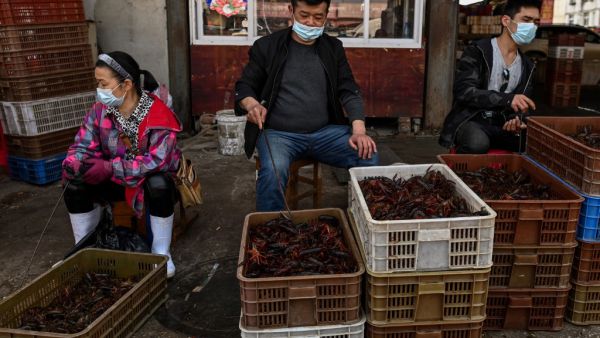Cities across China have proposed a '2.5-day weekend' to encourage consumers to shop amid an economic downturn caused by the coronavirus.
Officials of the eastern city of Nanjing urge companies to implement the new policy and 'extend the shopping time' for their workers in order to help boost the economy.
The new suggestion comes as China's economy is predicted to suffer its worst crash in 60 years with a shrink of nearly 10 per cent due to the coronavirus lockdown.
Experts warn that the effect of the lockdown on China's economy is thought to be an indicator of what European and US markets could expect to see once they start to relax restrictions.
On March 19, Jiangxi Province in eastern China took the lead in suggesting an extra half of day off to prompt citizens spending more time on shopping and going out.
Other provinces including Zhejiang, Hebei and Gansu followed suit and recommended the 2.5-day weekend to help revive the coronavirus-hit economy.
The city of Nanjing held a 'Four New' action conference on Saturday, releasing plans to encourage consumers by 'extending the shopping time and triggering new enthusiasm'.
A longer weekend will help unleash consumption potential and relieve pressure on local businesses, Wang Qiyan, director of China's Leisure Economy Research Centre, told the press.
But expert doubts that many workers and companies will welcome such proposals. Shen Jianfeng, director of the Law School of the China University of Labour Relations, said the extended weekend might put pressure on enterprises and workers may face pay cuts.
Financial data released last week showed analysts expect China's first-quarter GDP to suffer due to the economic shutdown caused by the pandemic, which began in Wuhan and was first reported at the end of December.
The tourism industry in China have reportedly decreased by nearly 70 per cent in the first three months of 2020.
More than 2,200 cinemas in China were forced to close permanently due to a severe loss of profit during the lockdown.
A global slowdown has also led to a collapse in the oil price, exacerbated by a row between Opec and Russia.
Economists say China may record its first-ever quarterly economic contraction since 1992 when it started publishing statistics on its gross domestic product (GDP).
The last time Beijing recorded a full year of economic shrinkage was 1976, as the Cultural Revolution ended, according to World Bank data.
The effect of the lockdown on China's economy is thought to be an indicator of what European and US markets could expect to see once they start to relax restrictions.
Experts have warned the huge impact on finances, businesses and consumer spending could see the UK economy shrink by as much as 15 to 25 per cent over the coming weeks and months.
Cities across China, which enforced strict lockdown measures since late January, have gradually eased the restrictions as the country claims to have largely contained the epidemic.
The former ground zero, Wuhan, lifted its 76-day lockdown on its 11million residents on April 8, allowing people to travel in and out of the city for the first time.
Globally, at least 2million people have been infected with the deadly disease and at least 137,150 have died.
China claims to have 84,489 confirmed, with 3,342 deaths, but these figures have been disputed.
This article has been adapted from its original source.








